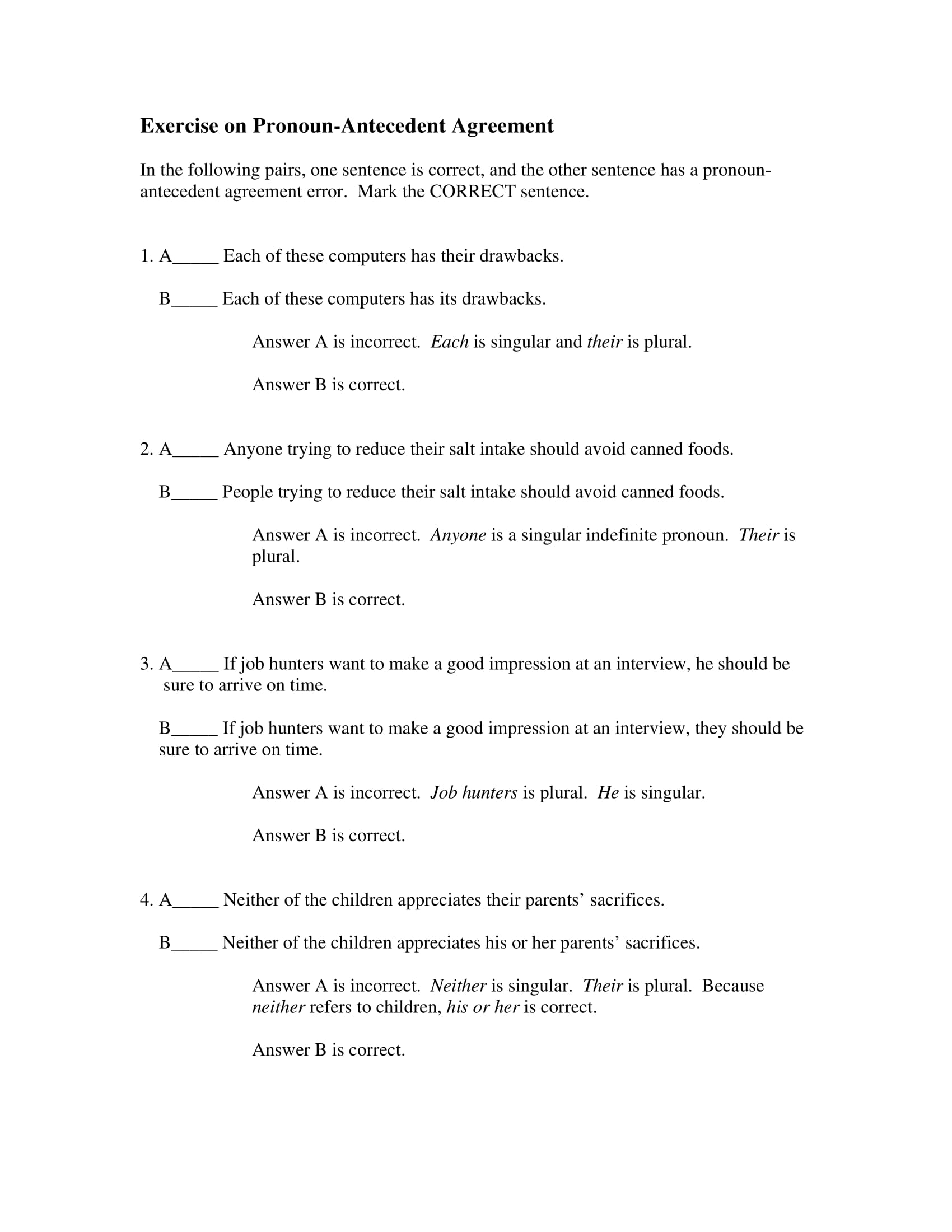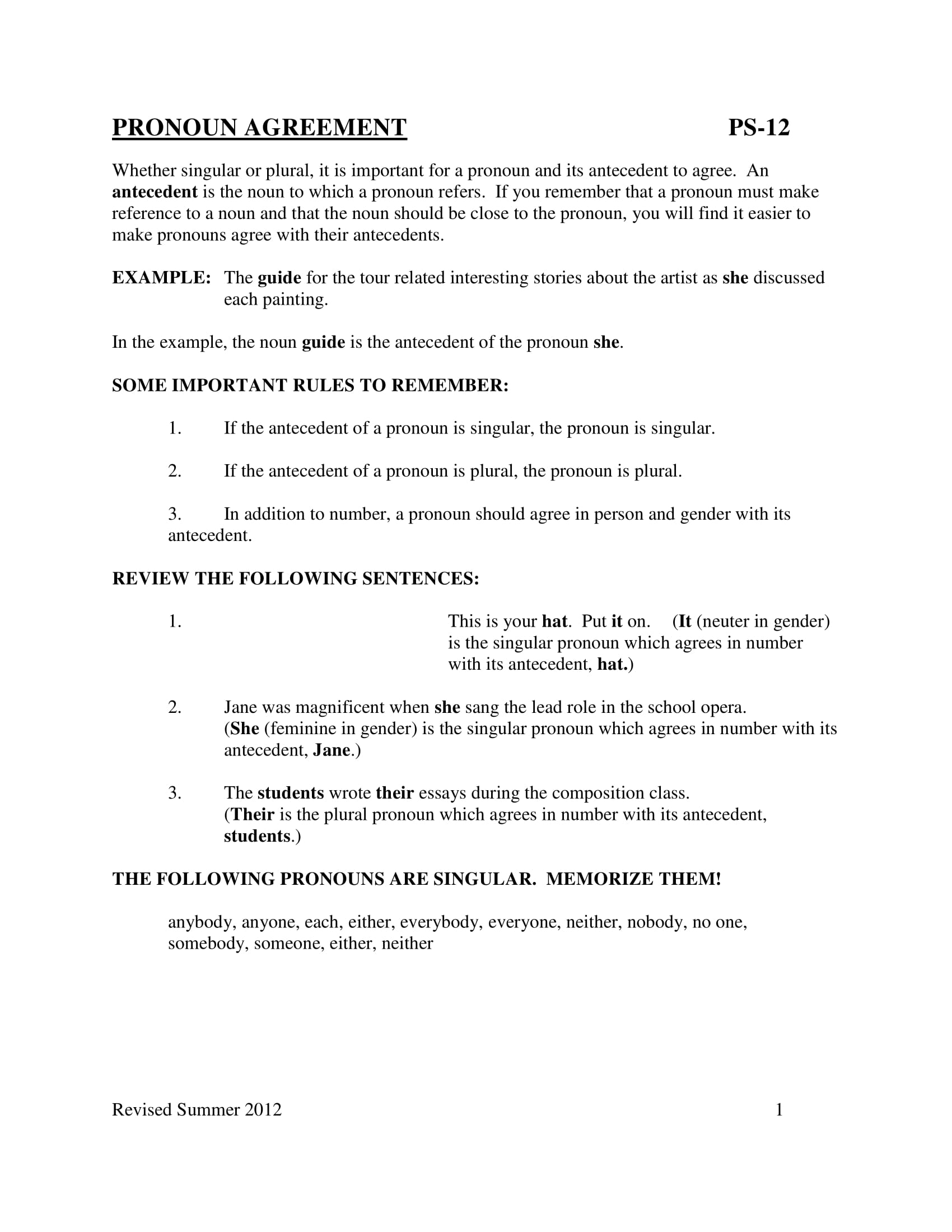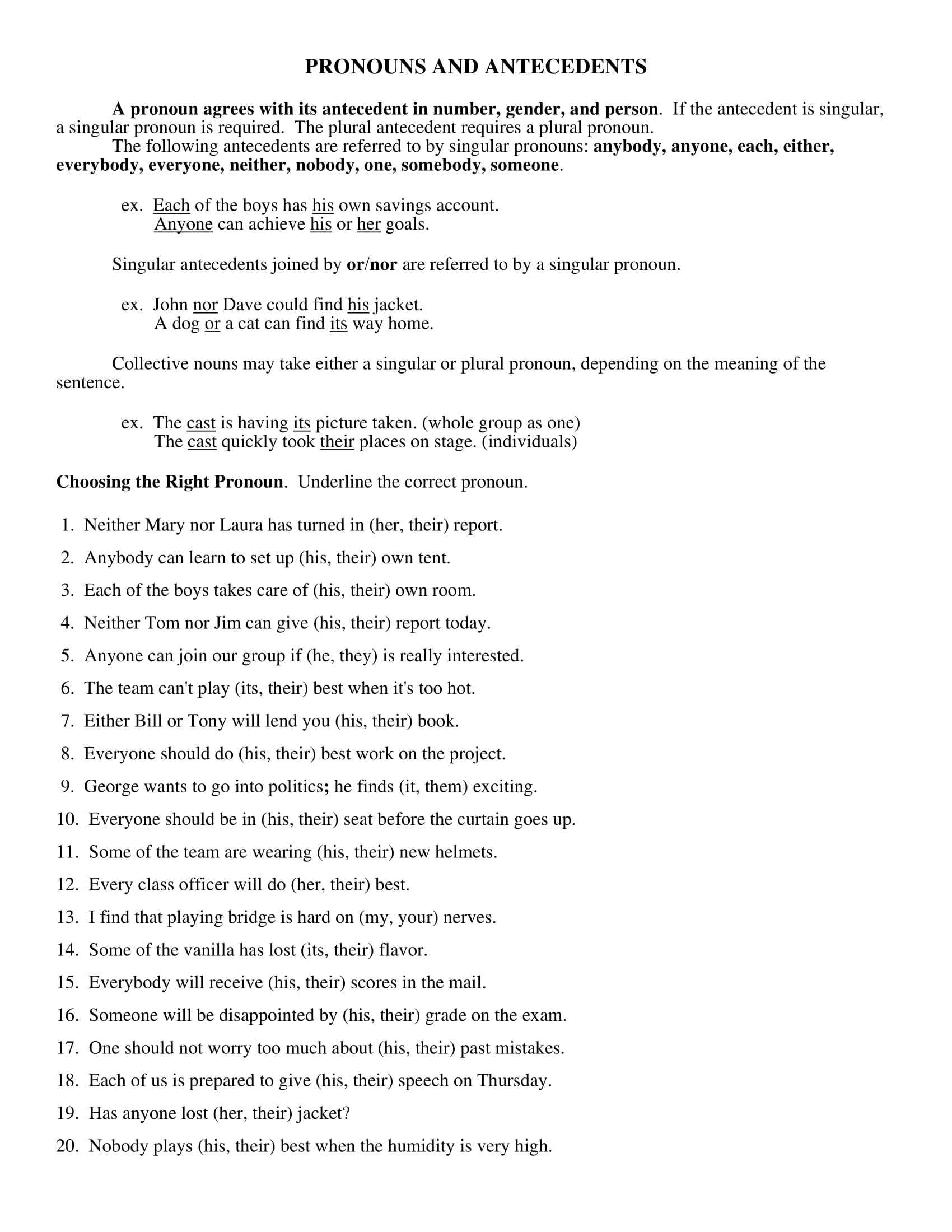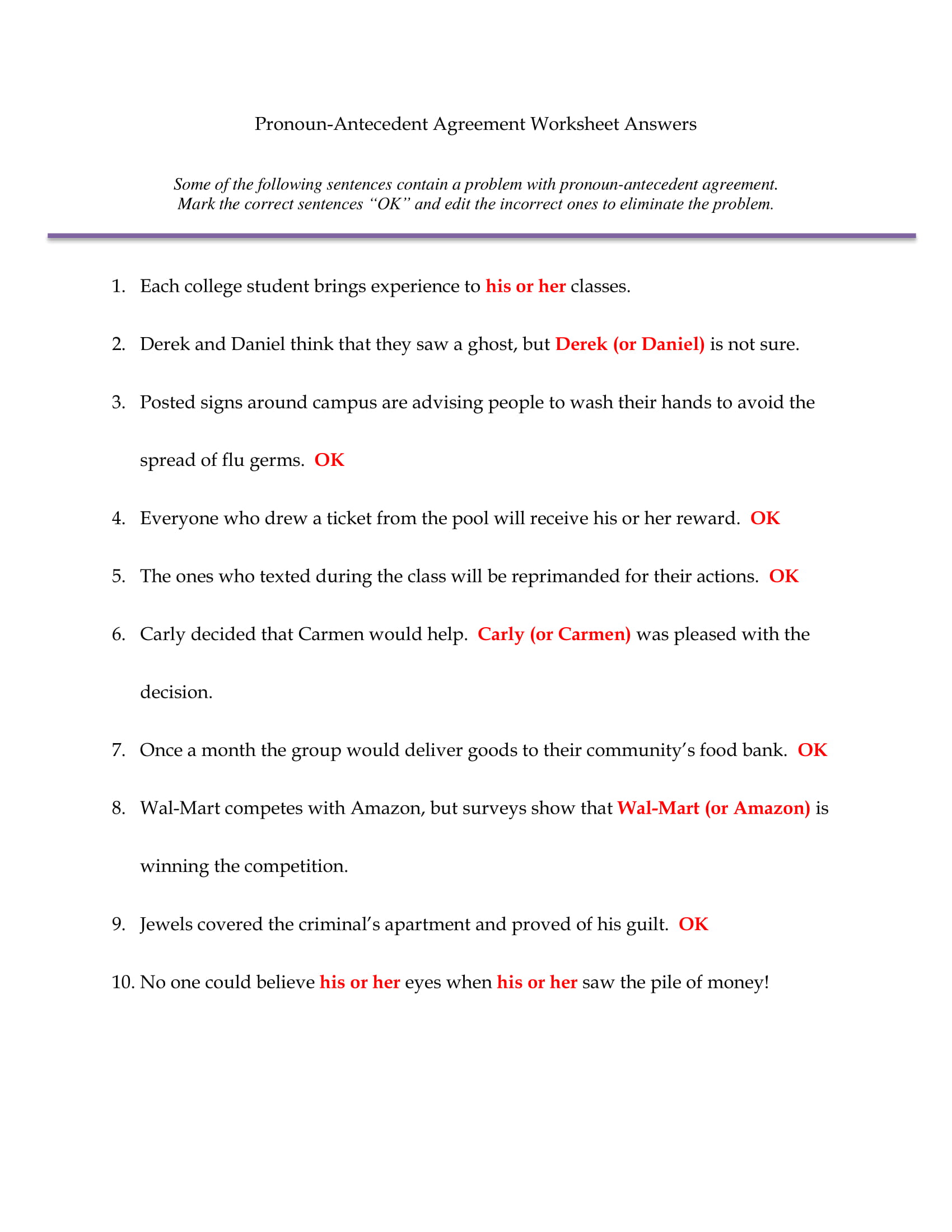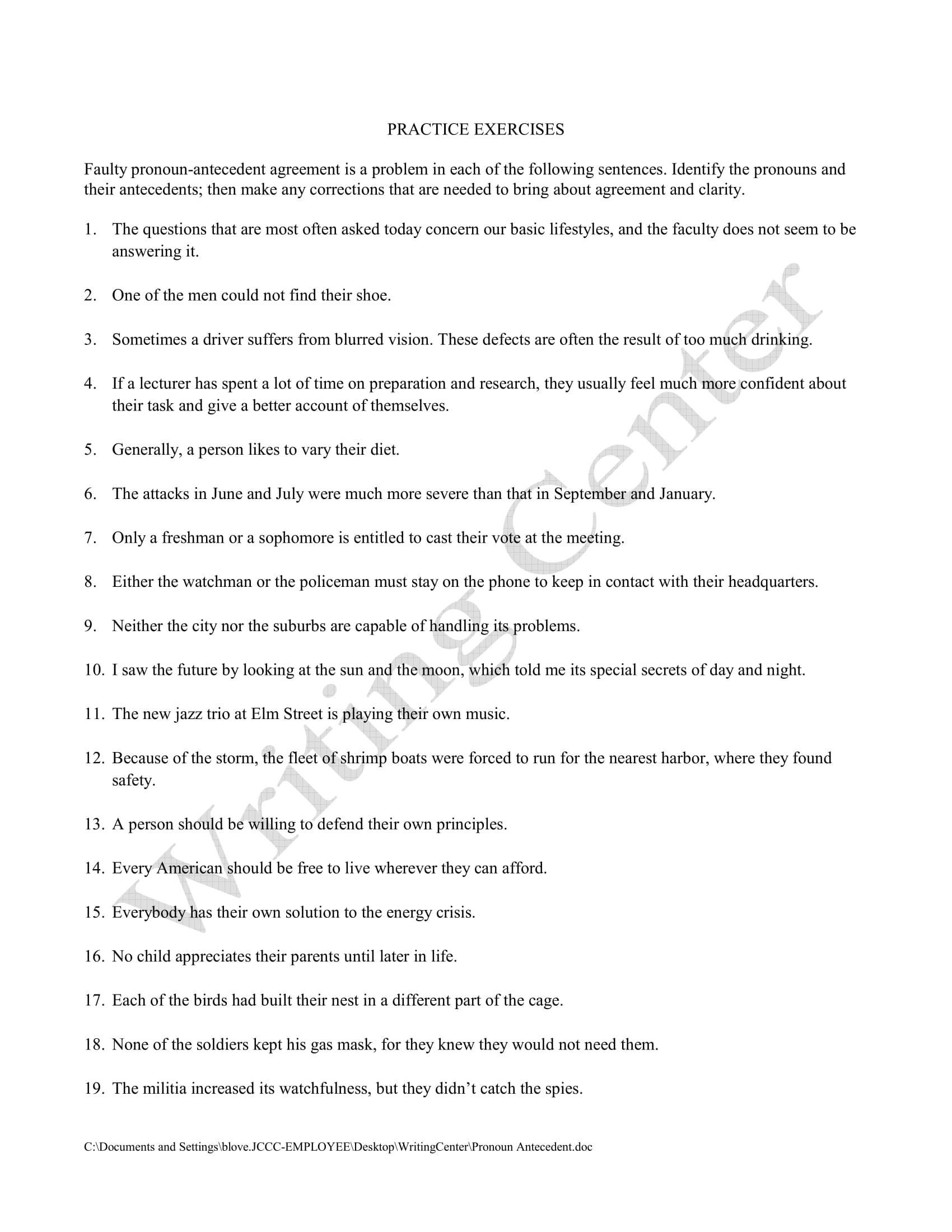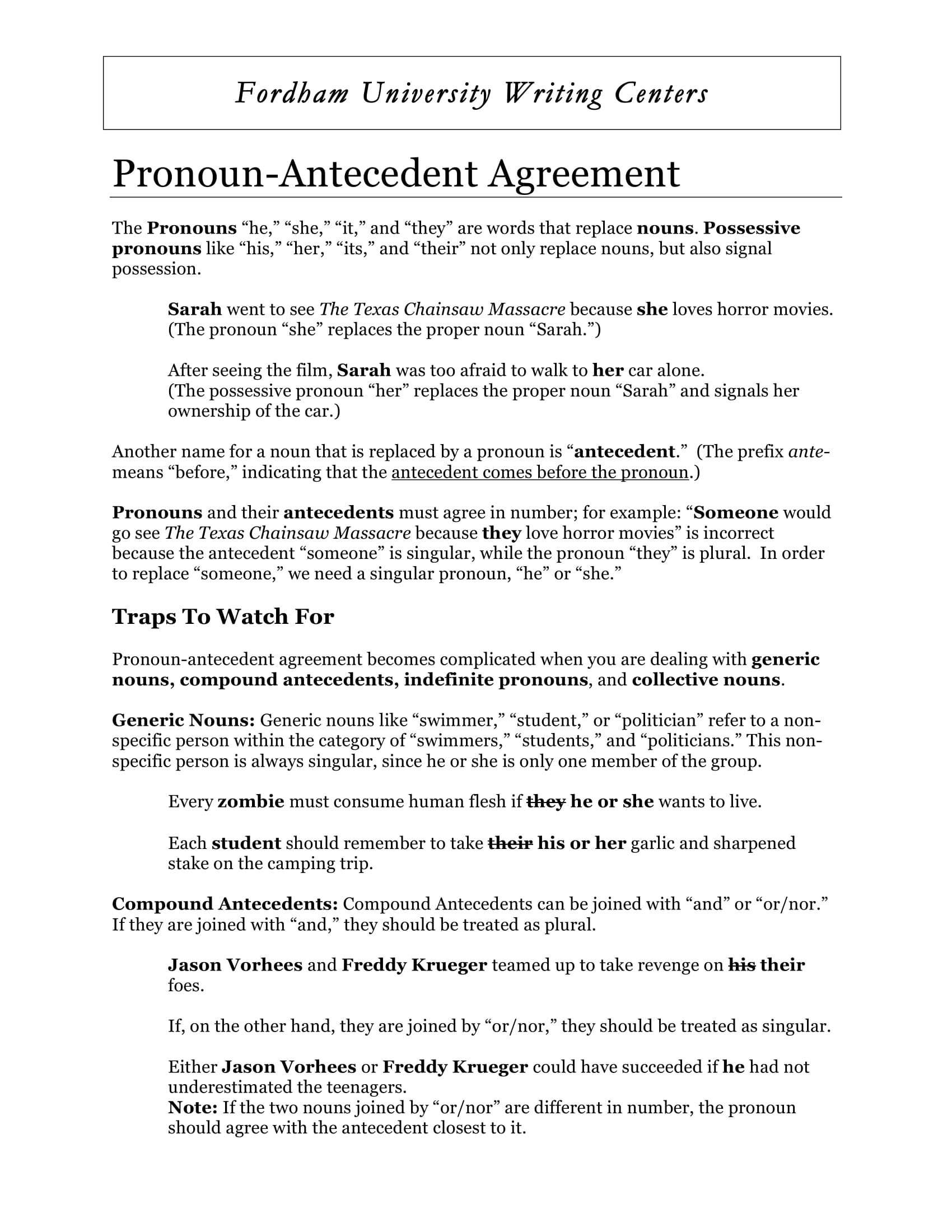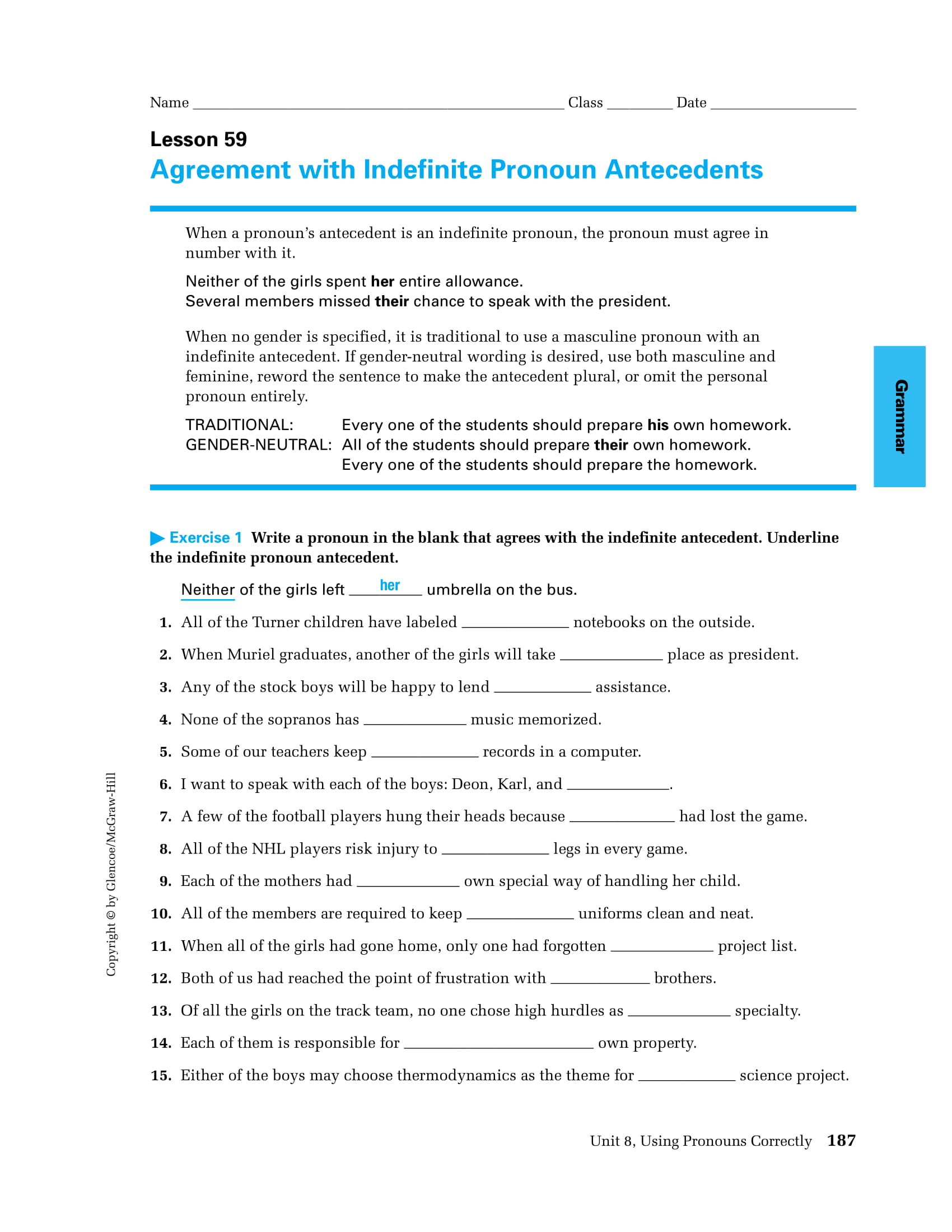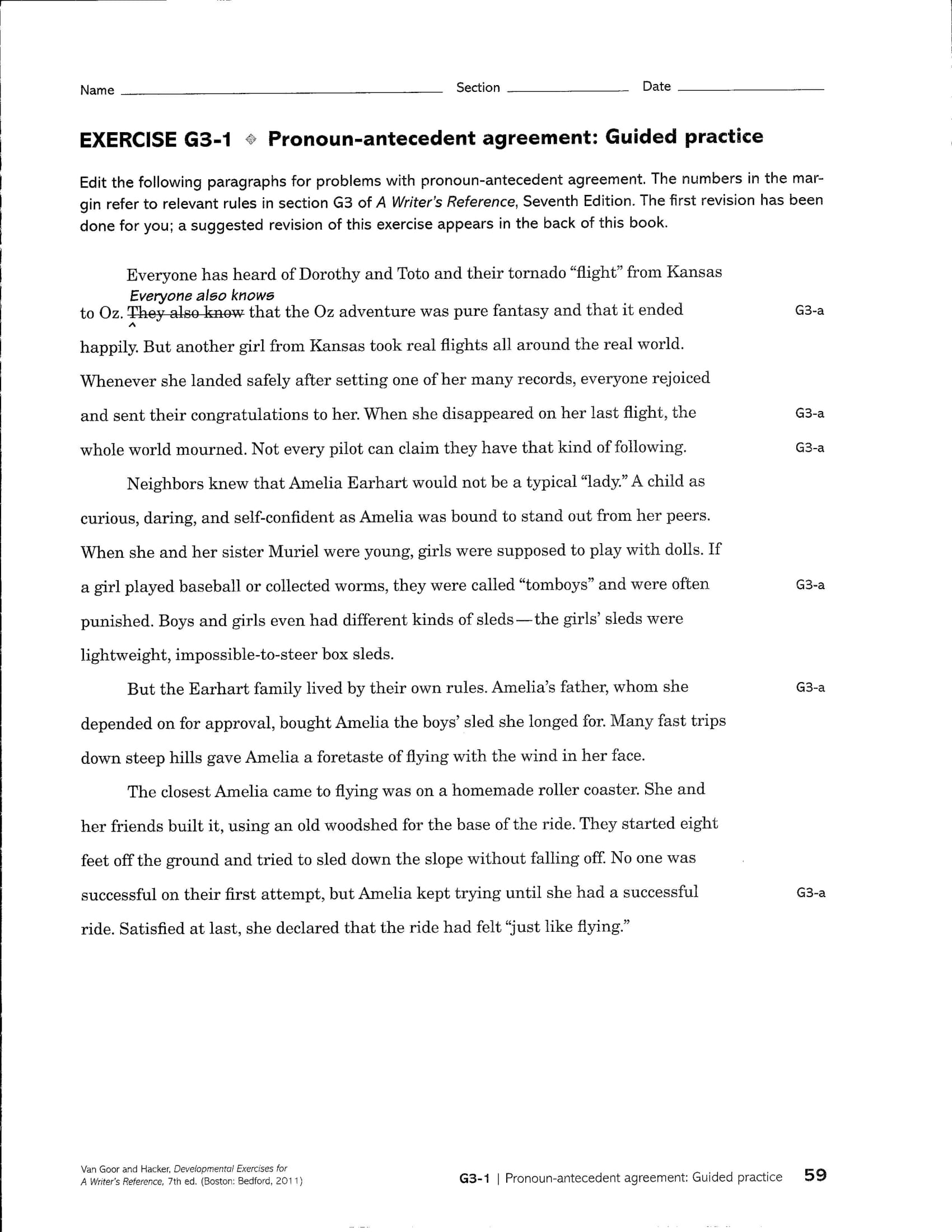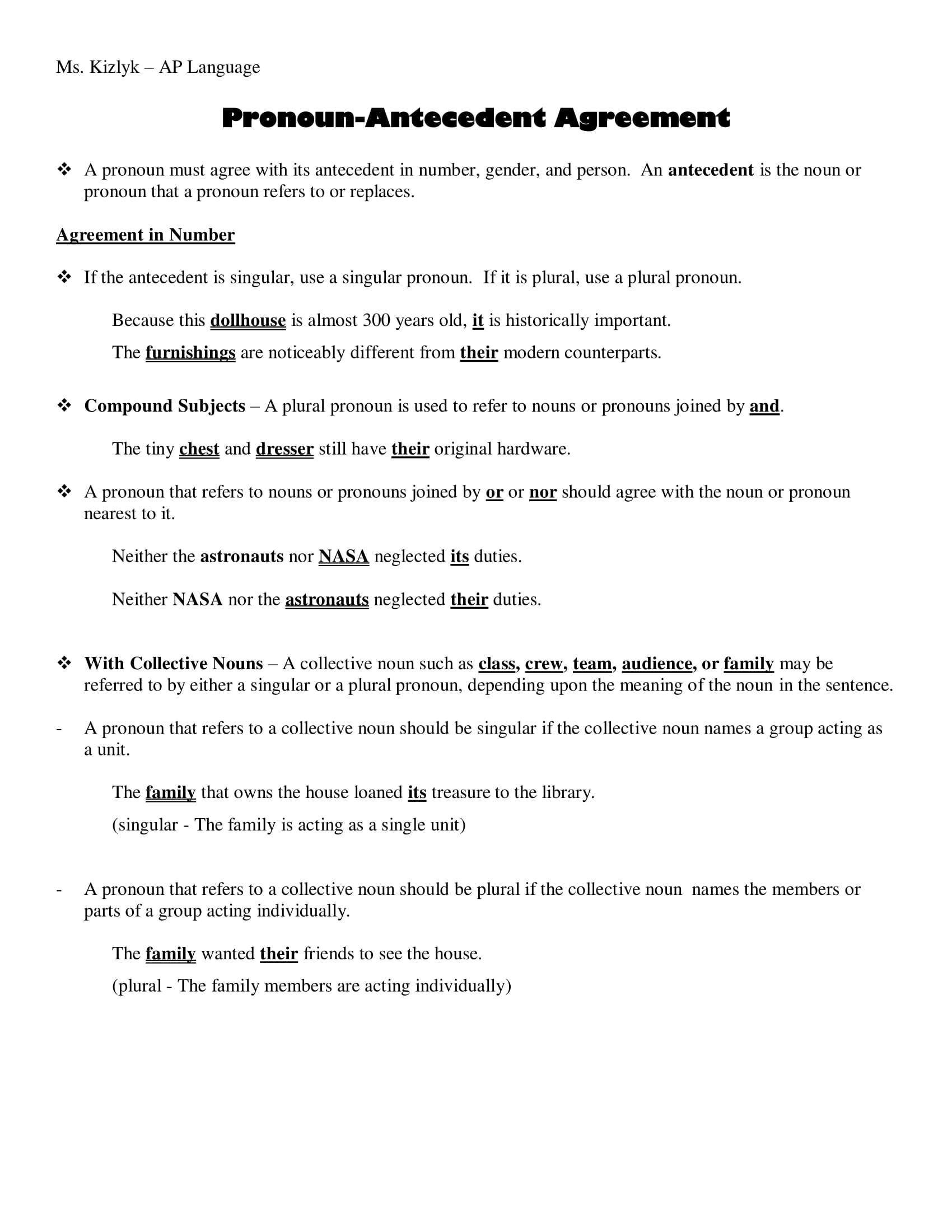9+ Pronoun Antecedent Examples
Even during grade school you have been already taught about the importance of grammar. You have been taught the basics of sentence construction in order to help you make better sentences that you will be using for the rest of your life. Flashback to grade school during English class when you were taught about the parts of speech that you tried so hard to familiarize and memorize. The eight different parts of speech in classifies all the words in the English language are as follows: Noun, Verb, Pronoun, Adjective, Adverb, Preposition, Conjunction, and Interjection. These are the fundamentals that you have learned in order for you to greatly improve your overall communication skills.
In this article, the pronoun-antecedent relationship with words will be thoroughly discussed in order for you to understand how it works and how you can perfectly and effectively use it in your sentences. It is important that you understand this concept in the English language so that you can communicate better, to avoid confusing the person you are talking to and just to improve your skills.

What is a Pronoun?
Since it is part of the eight parts of speech of the English language you should have a clear understand of what a pronoun is, how it works and how it it properly used. A pronoun is a word that substitutes for a noun or noun phrase. This is an important part of speech since it helps you substitute certain words specifically nouns in a sentence or paragraph given that it is still the same noun or subject that is being talked about. Pronouns allow you to avoid sounding repetitive in your sentences since it is very boring and even annoying to read the same name over and over again a single sentence or paragraph.
The absence of pronouns would mean that we will have to repeat your words over and over, it would make your speech and writing repetitive and cumbersome. Although pronouns are defined as words that replaces nouns, it can also stand in for for certain adverbs, adjectives, and other pronouns. In order to make your sentences flow better you can use pronouns to replace the names of person, animal, place or thing.
However, there are rules when using pronouns. It needs to agree with the number the word is replacing with was expressing. Simply put, when the word it replacing with is singular the pronoun should also be singular; if plural, the pronoun should also be plural. Doing this will ensure that you have a grammatically correct speech or writing. With that in mind, here are just some of the most commonly used pronouns: he, she it, they, their, them, her, his, him, we, who, and so much more.
Pronoun-Antecedent Agreement Exercise Sheet Example
Pronoun-Antecedent Agreement Guide Example
Types of Pronoun
Now that you basically a had a refresher about pronouns, you should now proceed to understanding its various types. This will enable you to write better and choose better pronouns in place of noun. Hence, here is list of all the different types of pronouns as well as some examples:
- Personal pronouns – The pronouns that are usually used as a subject of a sentence. These are usually associated as person, thing, or group; however, you have to distinguish whether it is used as singular or plural. Personal pronouns are as follows: I, we, you, he, she, it, and they.
- Objective pronouns – These pronouns are used as a grammatical object. They can be the object of preposition, verb or infinitive phrase. These are: me, us, you, him, her, it, and them.
- Possessive pronouns – These pronouns demonstrate ownership. Examples are as follows: mine, ours, yours, his, hers, its, and theirs.
- Demonstrative pronouns – These pronouns are used to identify and point to the noun or pronoun. These are as follows: this, that, these, and those.
- Interrogative pronouns – These are the pronouns that are used when asking a question. Here are examples: who, whom, what, which whoever, whomever, whatever, and whichever
- Relative pronouns – These are used to link clauses or phrases to the rest of the sentence. These refer to nouns mentioned previously, acting to introduce an adjective (relative) clause. This could be: who, whoever, whom, whomever, that, which, and whichever.
- Intensive pronouns – Visibly they are the pronouns ending with –self or –selves and are used to emphasize and intensify the word it is referring to. Examples are: myself, yourself, himself, herself, itself, ourselves, yourselves, and themselves.
- Reflexive pronouns – Similar to an intensive pronoun, these pronouns end with –self or –selves and refer back to the subject of a clause or sentence. These pronouns are usually preceded by the adverb, adjective, pronoun, or noun. These are: myself, yourself, himself, herself, itself, ourselves, yourselves, and themselves.
- Indefinite pronouns – These pronouns refer to one or more unspecified objects, beings, or places. Meaning they refer to not specific antecedent and refer to all, some, or none. There are quite a few of these pronouns, and a few examples are: one, few, any, nobody, anything, neither, either, nothing, anyone, everything, several, few, both and so on.
Pronoun-Antecedent Quiz Worksheet Example
Pronoun-Antecedent Agreement Quiz Answer Sheet Example
Rules When Using a Pronoun
Pronouns are generally easy to use. There main purpose is to substitute the noun or names of people, place, things and so on. However, when there are more than one subject in a single sentence it can get quite confusing especially when you have to consider the number it is referring to. To help you use pronouns more accurately and appropriately, here are the rules when it comes to using pronouns:
- Subject or personal pronouns can be used to begin sentences. Since the name already implies that it is a subject, there is no problem in using it as the main subject in sentences. For example: I did a great job.
- To avoid redundancy, you can also use subject pronouns to rename the subject. For example: It was he who decided we should go to Japan.
- Based on the definition, indefinite pronouns can be used even if there are no noun/s to refer to. They are capable of standing on their own. For example: No one likes the eat of fried cockroaches.
- There can be many uses to object pronouns. They can be used as direct objects, indirect objects, and objects of prepositions. For example: David talked to her about the mistake.
- There is no need for apostrophes when using possessive pronouns since they already demonstrate ownership. For example: The cat washed its whiskers.
Here are additional examples of how pronouns are effective used in a sentence. The pronouns in these examples are italicized:
- She is going on vacation.
- Don’t tell me that you can’t go with us.
- Anybody who says it won’t be fun has no clue what they are talking about.
- These are terribly steep stairs.
- We ran into each other at the mall.
- I’m not sure which is worse: rain or snow.
- It is one of the nicest Italian restaurants in town.
- Richard stared at himself in the mirror.
- The laundry isn’t going to do itself.
- Someone spilled orange juice all over the countertop!
Pronoun-Antecedent Practice Worksheet Example
Pronoun-Antecedent Agreement Reference Sheet Example
What is an Antecedent?
An antecedent is the word or words, specifically noun, or pronouns or noun phrases, that pronouns refer to in a sentence. The origin of the word antecedent means to go before, this means that when used in a sentence an antecedent is the word that goes before a pronoun. For example: Jane has already submitter her report yesterday. In the example, the antecedent of the pronoun her is the subject’s proper name Jane. However, there are instances, depending on how you construct your sentence where an antecedent is visible only after the proper. For example: When you see him, please tell John I’m going home early today.
An antecedent has a direct relationship with a pronoun. A pronoun will not make sense if it has not have an antecedent to refer to. For example: When you go to the store, they will need an ID. Who does they refer to? The only noun in the first clause is the word store, and although an pronoun can sometimes refer to another pronoun it just will not make sense in this case. There are also instances when the antecedent is not on the same sentence with the pronoun, but it will only make sense if there are no other antecedent in that same sentence.
Pronoun-Antecedent Agreement
Here is a brief explanation about the rules concerning pronoun-antecedent agreement. These are the general rules you have to follow in order to create a coherent and grammatically correct sentence:
Rule 1
The phrase or clause between the subject and verb does not change the number of the antecedent. The form in number, singular or plural, of the antecedent should be followed. For example: The box with shoelaces has its own place in the rack.
Rule 2
Singular indefinite pronouns used as antecedent take singular a pronoun; plural indefinite pronouns used as antecedent use plural form pronoun. Some examples:
Singular: Each of the clerks are busy with his or her tasks.
Plural: Both do their best to perform well.
Some indefinite pronouns modified by a prepositional phrase may either be singular or plural. The main thing to remember is if the object of the preposition is uncountable, you should use a singular pronoun; if the object is countable use a plural pronoun to refer to it. For example:
Singular: Some of the rice fell out its bag.
Plural: All of the utensils have lost their shine.
Rule 3
All compound subjects connected by the conjunction and always take a plural pronoun to refer to it. For example: Jack and Jill went up the hill to fill their buckets with water.
Rule 4
Other compound subjects joined with or/nor should always agree with the antecedent closer to the pronoun. For example:
Singular: Either the daughters or the mother brought her gift.
Plural: Neither the teacher nor the students had their lunches.
Rule 5
Depending on the meaning, collective nouns such as group, jury, crowd, team, audience, class, etc. may take singular or plural pronouns. For example:
Singular: The jury has read its verdict.
Plural: The jury members gave their opinions.
Rule 6
Titles of single entities such as books, organizations, associations, countries, etc. take singular form pronouns. For example: The Fault in Out Stars made its characters relatable.
Rule 7
Nouns that take a plural form but has singular meaning should always have singular pronoun. For example: Politics is confusing as it already is.
Rule 8
Every or Many a used before a noun or a series of nouns requires a singular pronoun referring to it. For example:
1. Every dog, cat, and bird has been fed with its dinner.
2. Many a boy wishes he was as handsome as Ryan Gosling.
Rule 9
Points to remember for this ruler: The number of is singular; A number of is plural. They should respective take their appropriate pronoun referent. For example:
1. The number of dogs in the shelter has decreases its number.
2. A number of dogs have lost their lives.
Pronoun-Antecedent Worksheet Example
Pronoun-Indefinite Antecedent Agreement Worksheet Example
How to Correct Pronoun-Antecedent Mistakes
If you are just as confused as you are before and keeps on making the same mistake with your pronoun-antecedent agreement, don’t fret. Here is short guide on how you can correct the mistakes you make with pronoun-antecedent:
- You can try to replace the plural pronoun with singular personal or subject pronouns like he or she, or it (or his or her or its.)
- When someone has been eating a lot, he or she is likely to have indigestion.
- Another thing you can try to do is to make the antecedent plural.
- When girls have been drinking, they are likely to be more talkative.
- Lastly, you can try to rewrite the whole sentence so that you can eliminate the problem of pronoun-antecedent agreement.
- A driver who has been drinking is likely to speed.
Pronoun-Antecedent Agreement Guided Practice Sheet Example
Pronoun-Antecedent Agreement Study Guide Example
We hope you find the discussions about the topics in this article useful and informative.



